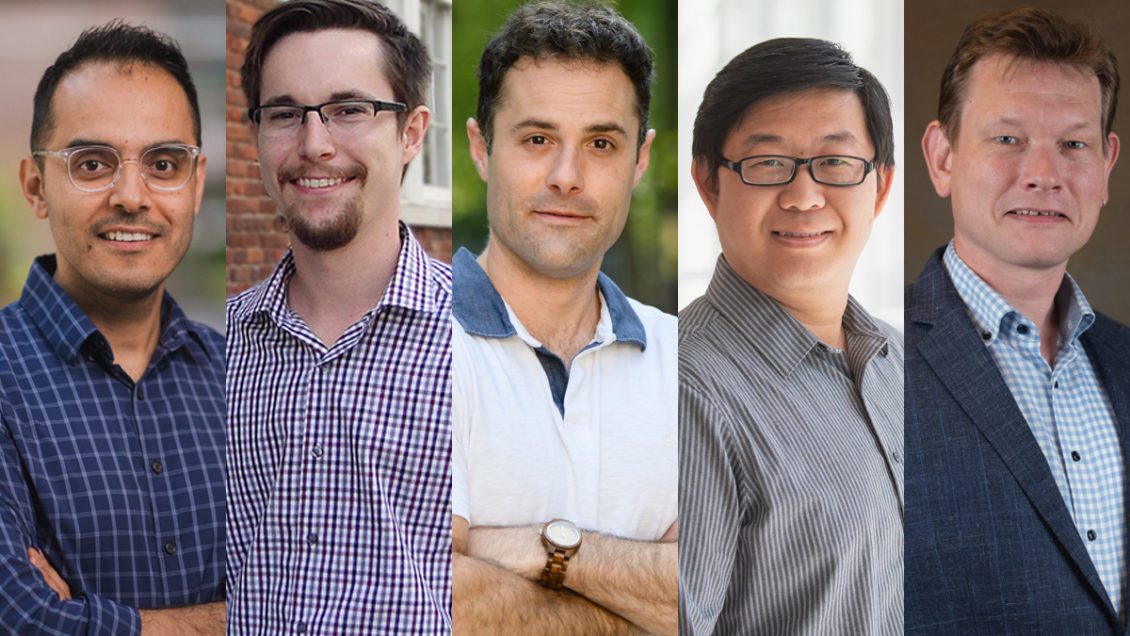Five assistant professors in the College of Engineering, Computing and Applied Sciences are receiving some of the nation’s top awards for engineers and scientists who are early in their careers, providing a boost to Clemson University’s research in smart materials, supercomputers and environmental sustainability.
The awardees are Fadi Abdeljawad, Jon Calhoun, Ezra Cates, Kai He and Ulf Schiller.

Their awards came from three separate federal agencies, each of which have grant programs aimed at supporting researchers early in their careers. Each award includes several hundred thousand dollars in research funding and was granted over the past year.
Anand Gramopadhye, the college’s dean, said the awards bode well for Clemson University’s research enterprise.
“The awards are celebrated in higher education because they are a sign of future success,” Gramopadhye said. “They are also a testament to the level of scholarship, creativity and hard work the recipients bring to the college. Recipients often go on to highly successful careers in academia, including leadership positions. I congratulate Drs. Abdeljawad, Calhoun, Cates, He and Schiller on these well-deserved honors.”
Below is a look at the award winners, the agencies funding their research and a brief summary of their projects. Click their names to learn more:
[vid origin=”youtube” vid_id=”o-2e-RKom8g” size=”medium” align=”right”]
Fadi Abdeljawad, assistant professor of mechanical engineering, Army Research Office Young Investigator Program Award: Abdeljawad and his team are working to better understand how nanocrystalline metallic alloys respond to extreme environments, such as heat and external forces. Their work could be the next step in creating a new generation of alloys with unprecedented properties, resulting in lighter, more fuel-efficient cars and airplanes.
Jon Calhoun, assistant professor of electrical and computer engineering, National Science Foundation CAREER Award: Calhoun’s project is aimed at helping engineers and scientists use supercomputers to solve increasingly large problems, potentially clearing the way for new research ranging from predicting the weather to designing better airplanes. It could become possible to run larger, more detailed experiments without having to spend millions of dollars on a new computer system, he said.
Ezra Cates, assistant professor of environmental engineering and Earth sciences, U.S. Environmental Protection Agency Early Career Award: Cates is studying how photocatalysis could remove per- and polyfluoroalkyl substances, or PFAS, from water. PFAS have contaminated drinking water supplies and groundwater at several sites around the country.
Kai He, assistant professor of materials science and engineering, National Science Foundation EPSCoR Research Infrastructure Improvement Track 4 Award: He is looking to advance the emerging field of spintronics, which could lead to computers that run faster and use less energy, while allowing them to continue shrinking in size. He and his team are planning to use electron microscopes at Brookhaven National Laboratory– some of the nation’s best– to study two-dimensional ferromagnetic materials.
Ulf Schiller, assistant professor of materials science and engineering, National Science Foundation CAREER Award: Schiller and his team will employ sophisticated supercomputing techniques to better understand complex fluids, a step toward creating new smart materials. The materials could be used in a host of fields, including energy storage, drug delivery and water treatment, and have applications in the food, cosmetics and pharmaceutical industries.
END
Get in touch and we will connect you with the author or another expert.
Or email us at news@clemson.edu

